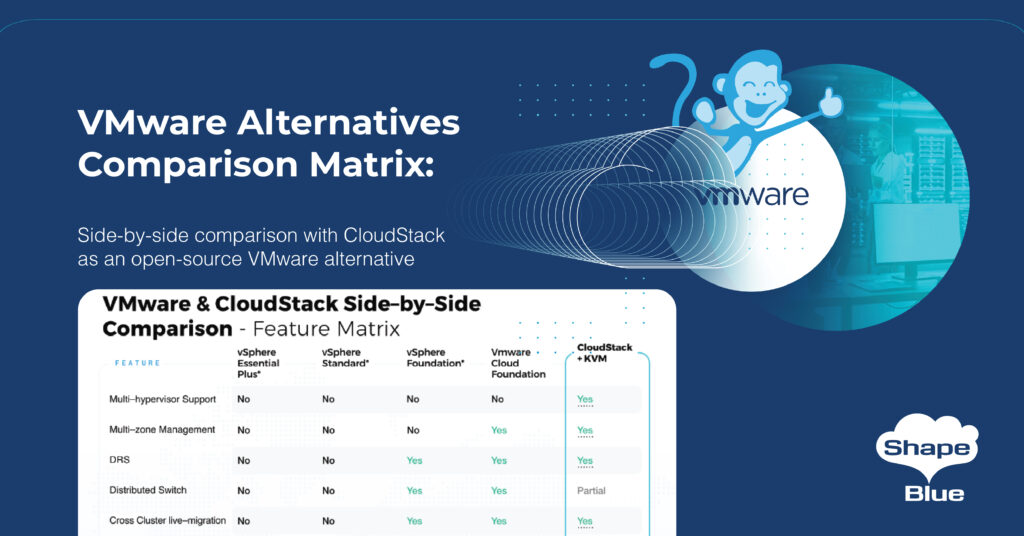VMware Alternatives: Top Picks & Why You Might Need One!
Are you truly maximizing your virtualization capabilities, or could there be a more efficient, cost-effective, and innovative solution out there? The quest for optimal performance, scalability, and value drives businesses to constantly re-evaluate their technology choices, and the world of virtualization is no exception.
In this guide, we will embark on a journey to explore the realm of virtualization beyond the established giant, VMware. We'll delve into the reasons why organizations are increasingly seeking VMware alternatives and highlight some of the top contenders in the market. This exploration is not about dismissing VMware's contributions, but rather about recognizing the evolving landscape and the diverse needs of modern businesses.
| Category | Information |
|---|---|
| Company | VMware, Inc. |
| Founded | 1998 |
| Founders | Diane Greene, Mendel Rosenblum, Scott Devine, Ellen Wang, Edouard Bugnion |
| Headquarters | Palo Alto, California, USA |
| Industry | Cloud Computing, Virtualization |
| Key Products | VMware vSphere, VMware Horizon, VMware NSX, VMware vSAN |
| Description | VMware is a leading provider of cloud computing and virtualization solutions. Its technology enables organizations to run, manage, connect, and secure applications across multiple clouds and devices. |
| Website | www.vmware.com |
VMware, a prominent figure in the virtualization landscape, offers a comprehensive platform that allows businesses to efficiently manage their IT infrastructure. Its core technology empowers organizations to create and manage virtual machines (VMs), enabling multiple operating systems and applications to run concurrently on a single physical server. This capability optimizes resource utilization, reduces hardware costs, and enhances overall IT efficiency.
The benefits of virtualization extend beyond simple server consolidation. VMware facilitates workload mobility, allowing businesses to seamlessly move applications between their data centers and the cloud. This flexibility is crucial in today's dynamic business environment, where organizations need to adapt quickly to changing demands and leverage the advantages of cloud computing.
The VMware ecosystem is vast and encompasses a range of products and services designed to meet the diverse needs of its customers. VMware vSphere, its flagship product, provides a robust foundation for server virtualization, offering advanced features for resource management, high availability, and security. VMware Horizon delivers virtual desktops and applications, enabling employees to access their work environments from any device, anywhere.
Despite VMware's widespread adoption and comprehensive feature set, the virtualization landscape is constantly evolving. New technologies and approaches are emerging, offering businesses alternative options that may better align with their specific requirements and budget constraints. This has led to a growing interest in exploring VMware alternatives.
- Aditi Mistry Nude Video Truth Or Rumor Exploring The Controversy
- Bestgore Alternatives Find Shocking Content Safely Updated
One key factor driving the search for alternatives is cost. VMware's licensing fees can be significant, especially for large enterprises with complex virtualization environments. Organizations are seeking more cost-effective solutions that provide similar functionality without the hefty price tag.
Another factor is the desire for greater flexibility and control. Some businesses find VMware's ecosystem to be somewhat restrictive, preferring open-source solutions or platforms that offer greater customization options. They may also be seeking alternatives that are better integrated with their existing infrastructure or cloud environments.
Moreover, the rise of hyperconverged infrastructure (HCI) has fueled the demand for VMware alternatives. HCI solutions combine computing, storage, and networking into a single, integrated appliance, simplifying IT management and reducing complexity. Several HCI vendors offer compelling alternatives to VMware's virtualization platform.
When evaluating VMware alternatives, it's important to consider several key factors, including performance, scalability, security, manageability, and cost. The chosen solution should be able to handle the organization's current and future workloads, provide robust security features, and be easy to manage and maintain.
Scale Computing HyperCore stands out as a robust VMware alternative, offering a range of features designed to address the virtualization needs of businesses of all sizes. Its hyperconverged infrastructure streamlines computing and storage operations, leading to enhanced efficiency and performance. This simplification can translate into significant cost savings and reduced administrative overhead.
HyperCore's architecture is designed for ease of use and scalability. It can be deployed quickly and easily, and it can be scaled up or down as needed to meet changing demands. Its intuitive management interface simplifies day-to-day operations, allowing IT staff to focus on more strategic initiatives.
Beyond Scale Computing HyperCore, several other VMware alternatives are worth considering. These include:
Nutanix: A leading provider of hyperconverged infrastructure, Nutanix offers a comprehensive platform for virtualization, storage, and networking. Its AHV hypervisor provides a native virtualization solution, eliminating the need for VMware's vSphere.
Microsoft Hyper-V: Integrated into Windows Server, Hyper-V is a popular virtualization platform for organizations that are already invested in the Microsoft ecosystem. It offers a range of features, including live migration, dynamic memory, and network virtualization.
Citrix XenServer: An open-source virtualization platform, XenServer is known for its performance and scalability. It's a popular choice for organizations that need to support demanding workloads, such as virtual desktops and applications.
Red Hat Virtualization: Based on the KVM hypervisor, Red Hat Virtualization provides a robust and scalable virtualization platform for enterprise environments. It's tightly integrated with Red Hat's other products, such as Red Hat Enterprise Linux and Red Hat OpenStack Platform.
OpenStack: An open-source cloud computing platform, OpenStack can be used to build private and public clouds. It includes a virtualization component called Nova, which can be used to manage virtual machines.
The integration of virtualization with cloud computing and AI is becoming increasingly critical. As businesses embrace cloud-native architectures and leverage AI-powered applications, they need virtualization solutions that can seamlessly integrate with these technologies. VMware and its alternatives are all striving to meet this demand.
VMware operates on three key components. vSphere is the core of server virtualization. It's the foundation of VMware's virtualization platform, providing essential services for computing, storage, and networking. vSphere is the first layer of virtualization that sits directly on the hardware, abstracting the underlying resources and making them available to virtual machines.
Before exploring VMware alternatives, understanding VMware's dominance is crucial. VMware has been a dominant force in virtualization, and it's important to understand why. It offers a comprehensive suite of products and services, a large ecosystem of partners, and a proven track record of success. Its established presence, extensive feature set, and strong ecosystem support ensure its ongoing relevance in enterprise IT environments. Yes, VMware continues to be widely used by companies around the world, thanks to its comprehensive suite of virtualization and cloud management solutions.
This means that your VMware alternative needs to be fully scalable. Scalability is essential to ensure that multiple virtual machines can be deployed as needed. Your VMware alternative solution needs to maintain a steady, secure, and stable level of performance at all times. The VMware alternative should be fully scalable to ensure that multiple virtual machines can be deployed as needed while consistently delivering a secure and stable level of performance.
In 2001, VMware entered the server market after releasing its hosted VMware Server and hostless VMware ESX Server. VMware is a networking, virtualization, and cloud computing company based in Palo Alto, California. Diane Greene, Mendel Rosenblum, Scott Devine, Ellen Wang, and Edouard Bugnion founded the company in 1998.
This post considers the factors behind a shift in direction and the top VMware alternatives in 2023. The world of virtualization is definitely evolving, and this post will consider the factors behind a shift in direction and the top VMware alternatives.
In this article, we discuss the top VMware competitors and alternatives. The aim is to identify the best VMware alternatives to elevate your virtualization and cloud computing capabilities.
When evaluating VMware alternatives, consider these four main types. Filter to find the best alternatives. VMware Workstation Pro alternatives are mainly virtualization tools, but if you're looking for remote desktop tools or cloud computing services, you can filter accordingly.
- Ullu Web Series Movierulz The Hot Risky Streaming Trend
- Subhashree Sahu Video The Privacy Debate What Happened

Top 8 VMware Alternatives Pure Storage Blog

Top VMWare Alternatives Benefits & Pricing V2 Cloud

Apache CloudStack vs. Nutanix as VMware Alternatives for Virtualisation